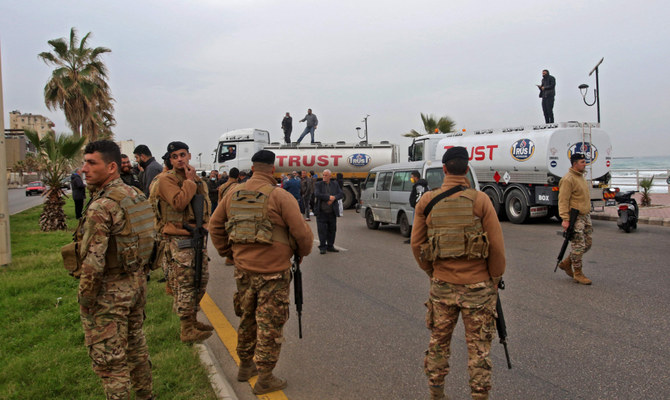Lebanon’s public transport drivers blocked roads on Thursday, paralyzing traffic throughout the country in protest against the manipulation of exchange rates that has left them out of pocket.
A driver in downtown Beirut said: “We can barely afford hospitalization or medicine. We are begging healthcare associations for our rights that the state is supposed to secure for us.”
Banks did not open on Thursday, as employees were unable to get to work, while schools and universities were also closed.
In less than a year since the removal of subsidies, the price of a 20-liter canister of gasoline has increased tenfold to almost 400,000 Lebanese pounds ($264), while the minimum monthly wage of 675,000 pounds has remained unchanged.
Fadi Abou Shakra, a representative of Lebanon’s fuel distributors who took part in the protests, said: “Our issue with the state is the rise in the exchange rate. Officials did nothing to control the illegal platforms manipulating the exchange rate. It is not our hobby to block roads and create problems. Today is a day of anger and we’ll see what next week brings.”
Soldiers and other security forces were deployed to control the situation after disputes broke out between protesters and members of the public trying to use the blocked roads.
The protesters were supported by the head of the General Labor Union, Bechara Al-Asmar, who said the action was “a cry for officials to perform their role and duties toward the people.”
The protesters’ demands focused on maintaining subsidies on bread, fuel and other basic items, he said, adding that he was disappointed at the small number of people involved in the action.
Several public transport drivers said they were against the protest and would not take part and were not affiliated with the parties that initiated it.
Bassam Tlais, head of the Land Transport Union, said: “Today is directed against the government, which has not fulfilled its promises to support the land transport sector and stop violations. We could not care less about politics or the reasons for the Cabinet’s failure to convene.”
Political observers said Thursday’s protests were linked to the Cabinet impasse caused by ministers from Hezbollah and the Amal Movement boycotting sessions. The labor unions are controlled by unionists loyal to the to the two parties.
Meanwhile, a huge explosion rocked the Nabatiyeh region at dawn on Thursday.
Lebanon’s National News Agency said: “A fire broke out in a private electricity generator. The flames quickly reached a diesel tank belonging to a cafe in Wadi Houmine. The fire spread to neighboring areas and caused the explosion of mines, cluster bombs and old unexploded ordnance from the Israeli aggression in July 2006.”
Residents of the towns of Houmine, Roumine and Deir Ez-Zahrani reported fires breaking out in the surrounding forests. Others said members of Hezbollah rushed to the scene of the explosion and cordoned off the area, preventing reporters from getting too close.

